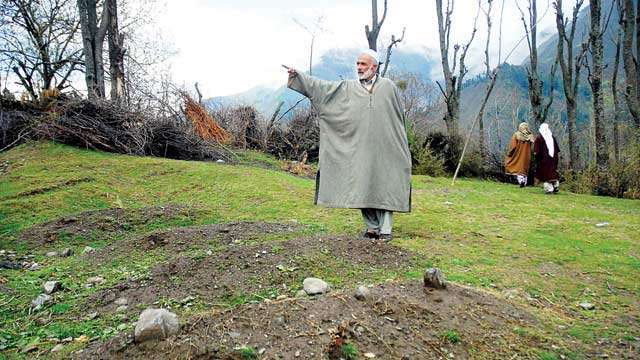Unmarked Graves in Kashmir Expose Pakistan’s Proxy War, Its Propaganda Crumbles Under New Research

For decades, Pakistan has built its foreign policy narrative on a single claim: that India commits systemic human rights violations in Kashmir. From podiums at the United Nations to opinion columns in Western newspapers, Islamabad has falsely projected an image of Indian forces running a ruthless campaign of oppression in Kashmir.
At the heart of this propaganda lies one recurring allegation—the existence of unmarked graves supposedly holding the bodies of Kashmiri civilians killed in cold blood. These graves, Pakistan claims, are evidence of mass disappearances, extrajudicial killings, and war crimes. It is a story that has found sympathetic ears across the globe. Human rights organizations, think tanks, and even some Western governments have echoed the claim without pressing hard for empirical verification.
Pakistan’s media ecosystem, dominated by ISI influence, has amplified the story with carefully crafted reports and dramatic imagery. Activist groups sympathetic to separatism in Kashmir have further reinforced it by publishing lists of the “disappeared” and staging demonstrations abroad.
The image created is one of mass atrocities buried beneath the soil of the valley—quite literally. Yet when this narrative is subjected to data-driven, scientific scrutiny, the foundation collapses. The most comprehensive investigation to date, conducted in 2025 by the Save Youth Save Future Foundation (SYSF) of Kashmir, provides clarity on an issue clouded for too long by propaganda.
Researchers studied more than 4,000 unmarked graves across Sopore, Kupwara, Baramulla, and Handwara in North Kashmir. The results were striking: nearly 90% of the bodies were of militants. Of these, a staggering 61.5% were foreign terrorists—most from Pakistan, with others from Afghanistan and beyond—while another 29.8% were local Kashmiri militants who had taken up arms. Only 0.2% of the graves – less than one in 500 – contained civilians.
The Dataset is Statistically Solid and Verifiable
This dataset is statistically solid, verifiable, and devastating for Pakistan’s long-standing claims. The graves expose Pakistan’s role in perpetuating violence in Kashmir.
Each grave of a Pakistani or foreign militant is a silent testimony to Islamabad’s policy of exporting jihad across borders. Each burial site is a marker of infiltration, of training camps in Pakistan-administered territory, of terrorist financing networks, and of recruitment drives that radicalized young men and sent them to die on Kashmiri soil.
The rhetoric of “India killing innocents” cannot survive against these numbers. The conflict is not defined by Indian forces harming unarmed civilians; the conflict is defined by India defending its territory against an unending wave of foreign-backed militancy. The graves do not support Pakistan’s narrative; they indict Pakistan. They record the human cost of Pakistan’s proxy war—a strategy that has destroyed countless lives on both sides of the Line of Control.
Civilian Casualties Were The Result Of Terrorist Violence
The findings of the SYSF investigation align with decades of counter-insurgency records in Jammu and Kashmir. Since the eruption of militancy in 1989, the majority of deaths in the region have occurred during terrorist attacks.
Civilian casualties—tragic and undeniable—were overwhelmingly the result of terrorist violence: car bombings in crowded marketplaces, targeted assassinations of local leaders, and indiscriminate shootings. Groups like Lashkar-e-Taiba, Jaish-e-Mohammed, and Hizbul Mujahideen—creations and clients of Pakistan’s Inter-Services Intelligence (ISI)—bear direct responsibility for thousands of such killings. These organizations targeted Kashmiri Pandits in the 1990s, forced minorities into exile, and assassinated Muslims who resisted their Islamist agenda.
In this context, the graves across North Kashmir tell a very different story than the one Pakistan promotes. They are not mass graves of innocents killed by the state, but cemeteries of militants who died fighting Indian security forces in armed combat.
Distortion of Global Perception
Why, then, does Pakistan persist with its collapsing narrative? The answer lies in Islamabad’s mastery of propaganda. For decades, Pakistan has weaponized human rights discourse to mask its sponsorship of terrorism.
Reports by separatist-aligned organizations or sympathetic tribunals have been uncritically circulated in international media. Western governments, often eager to appear balanced or fearful of alienating Pakistan due to strategic interests, have occasionally echoed these claims without demanding empirical verification.
The result has been a distortion of global perception: India is placed under scrutiny for supposed human rights violations, while Pakistan—responsible for the radicalization, arming, and dispatch of militants—escapes accountability. The graves have been presented as one of the strongest pieces of “evidence” in this campaign. With the SYSF study, that illusion has been shattered.
Pakistan – A Case Study in Projection
The hypocrisy is glaring. This is the same Pakistan that claims compassion for Kashmiris while systematically brutalizing its own populations. In Balochistan, Sindh, and the tribal areas, Pakistan’s military and intelligence agencies have dumped thousands of bodies in unmarked graves—victims of enforced disappearances and extrajudicial killings. Minority groups such as Shias, Ahmadis, and Christians face relentless persecution. Journalists who expose the state’s abuses are silenced, exiled, or killed. Pakistan followed the same template in suppressing dissent in Kashmir as it did in its own country.
That a country with such a bloodstained domestic record accuses India of mass atrocities in Kashmir is a case study in projection. If unmarked graves are evidence of crimes, Pakistan’s own landscape is filled with them—yet its rulers deflect attention by pointing fingers at India.
The implications of the SYSF study go beyond geopolitical debate; they touch on human tragedy. Every grave of a Pakistani fighter in Kashmir is not just a mark against Islamabad’s policies—it is also evidence of how Pakistan sacrifices its own citizens. Poor families in Punjab and Khyber Pakhtunkhwa have seen their sons recruited, radicalized, trained, and dispatched to die in a foreign land.
On Both Sides of LOC, Pakistan Used Youths As Pawns In Cynical Military Strategy To Keep Kashmir Burning
The victims are not only Indian security personnel or Kashmiri civilians caught in the crossfire. They are also the countless Pakistani families who lost children to the ISI’s jihad factory.
Young men, often barely out of adolescence, were told they were fighting for faith and freedom. In reality, they were pawns in a cynical military strategy designed to keep Kashmir burning and to justify Pakistan’s oversized security establishment. The unmarked graves of Kashmir are therefore not just a record of violence in the valley; they are a ledger of Pakistan’s exploitation of its own population in pursuit of strategic goals.
The primary driver of conflict in Kashmir is Pakistan’s endless supply of militants, weapons, and lies. The real threat to peace in Kashmir is not India’s defense of its sovereignty but Pakistan’s relentless proxy war
India’s counter-terrorism operations include stern regulations and safeguards to minimize civilian harm. Accountability and transparency are essential in any counter-terrorism effort. And context is crucial. No serious analysis can label the killing of armed foreign terrorists as systematic targeting of civilians. To collapse these categories, as Pakistan does, is to erase the fundamental distinction between counter-terrorism efforts by India and state-sponsored terrorism by Pakistan.
By blurring this line, Islamabad manipulates international opinion and dishonours genuine victims. It turns individual tragedies into tools of propaganda, folding them into a false narrative that undermines the credibility of real human rights advocacy.
A Narrative Reversed
Ultimately, the unmarked graves of Kashmir tell a story, but not the one Pakistan has tried to sell. They reveal a state that exports jihad, manipulates tragedy, and destabilizes an entire region to sustain its military-jihadi complex. They show that the primary drivers of conflict in Kashmir are not Indian forces but Pakistan’s endless supply of militants, weapons, and lies.
Civilian suffering must never be denied or minimized. But to understand Kashmir honestly, the world must confront the data. The graves are markers of Pakistan’s failed strategy, etched into Kashmiri soil. Every statistic points in one direction: Pakistan is the architect of death in the valley.
The myth of unmarked graves has now been busted. What remains is the truth—ugly, inconvenient, and undeniable. Kashmir’s tragedy lies in Pakistan’s endless war by proxy. Until that is acknowledged, peace will remain elusive, and more graves—tragically—will continue to be dug.
Pakistan’s decades-long propaganda war against India has finally been unmasked. For years, it weaponized the myth of unmarked graves to malign India on global platforms, conveniently hiding its own role as the epicenter of terrorism in South Asia.
The latest research lays bare the truth: these graves are not evidence of Indian “massacres,” but a silent testimony of Pakistan’s militant export that has ravaged Jammu and Kashmir. From sponsoring jihadists to orchestrating disinformation campaigns, Islamabad has thrived on lies. This façade is crumbling. It is high time the international community stops indulging Pakistan’s deceit, calls out its terror factory for what it is, and recognizes that the real threat to peace in Kashmir is not India’s defense of its sovereignty but Pakistan’s relentless proxy war.
(Got a fresh perspective? C-KAR invites original articles and opinion pieces that haven’t been published elsewhere. Send your submissions to deputydirector@c-kar.com)
Dr Syed Eesar Mehdi is a Research Fellow at International Centre for Peace Studies, New Delhi, India. The views expressed here are his own. He can be reached @ eesar.mehdi@gmail.com





